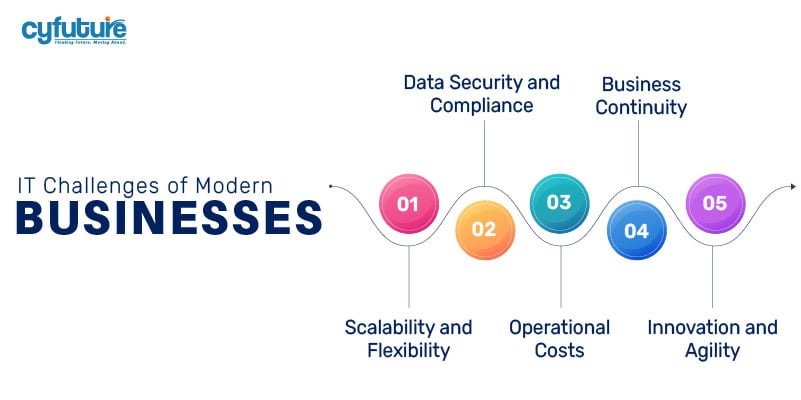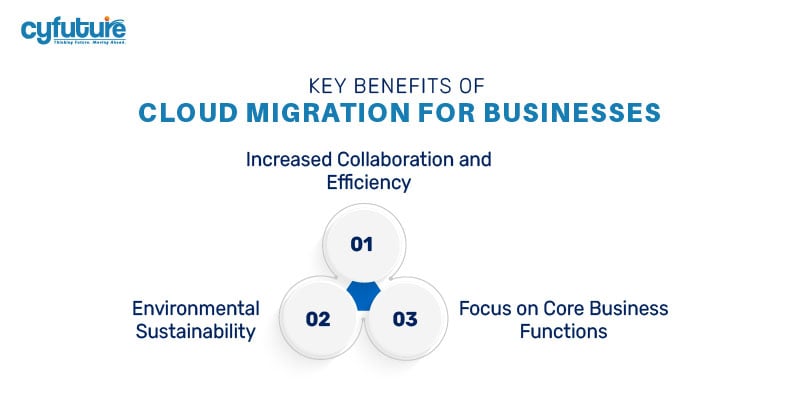-
Get Cloud GPU Server - Register Now!
Toggle navigation

Businesses face an increasing number of IT difficulties that require creative solutions in an era where digital transformation is not just a luxury but also a requirement. Traditional infrastructures and IT systems for managing huge amounts of data, and maintaining security, scale, and operational efficiency tend to become inadequate for businesses in an age of innovation.
But, what if there was an opportunity to streamline operations, reduce costs, and improve productivity all while maintaining the highest levels of security and flexibility? Cloud migration services are one of the powerful solutions revolutionizing the approach businesses have toward their IT challenges.
The entire cloud migration process is about migrating applications, data, and workloads from on-premises systems to cloud-based platforms. As such, it offers businesses a whole array of efficiency, security, and various other benefits. But will cloud migration really solve all the IT challenges?
In this comprehensive blog piece, we will explore how this transformative approach helps address key pain points, as well as why it is the cornerstone of IT strategies around the world. So, let’s delve deep into the knowledge pool!

Before diving into the potential solutions that cloud migration services can offer, it’s first important to understand the challenges businesses face in managing their IT systems today.
As businesses grow, their need for more computing power, storage, and processing capabilities also grows. In traditional IT infrastructures, scaling does not always occur efficiently. It either bottlenecks performance or causes costly upgrades. Without the flexibility to adapt resources to meet the current needs of the business, organizations get limited by obsolete systems and, therefore, are prevented from realizing their full growth potential.
In a world where cyberattacks are getting more sophisticated, it has never been more important to protect sensitive data. However, traditional IT infrastructures can be vulnerable to threats and may need constant monitoring and patching to stay secure. Compliance with industry regulations and standards adds to the complexity of the security landscape, requiring more resources and expertise.
On-premises IT infrastructure has tremendous costs: hardware, software, licensing fees, power consumption, and people to run the systems. These are pretty heavy burdens, especially on smaller businesses with limited resources.
Downtime can be very destructive to a business, leading to lost revenue, loss of customer trust, and damage to reputation. High availability and continuity of business operations require robust disaster recovery and backup solutions, which are often expensive and complex to maintain on traditional IT infrastructures.
Businesses must stay ahead of technological trends to maintain their edge in this competitive environment. Traditional IT systems may lack the agility required to adopt new technologies quickly, leading to stagnation and missed opportunities for innovation.
Knowing what problems companies face, we are now ready to find out how cloud migration services will overcome all these obstacles. Cloud migration allows organizations to exploit cutting-edge technologies more adaptive, scalable, and secure than those of legacy systems. Let us see how each challenge listed above can be dealt with through cloud migration.
The most appealing reason to embrace cloud migration is the unparalleled scalability offered by cloud services. Cloud platforms offer businesses the ease of scaling IT resources up or down without having to pay for unused services.
Whether it is about adjusting storage capacity during peak periods or provisioning additional computing power for new projects, cloud services offer unmatched flexibility. This dynamical scaling ability allows businesses to remain agile and responsive to changing demands without overcommitting to costly infrastructure.
Business organizations always prioritize security, and cloud service providers understand the importance of data security. State-of-the-art security protocols are embedded in cloud platforms, such as data encryption, multi-factor authentication, and advanced threat detection systems, thereby providing more security against cyber threats.
Moreover, the reputed cloud providers are often industry-specific compliance standards such as GDPR, HIPAA, and PCI-DSS, which will make it easier for business organizations to meet regulatory requirements without investing in costly compliance management infrastructure.
This will allow businesses to migrate into the cloud, significantly reducing vulnerability to breaches and ensuring their systems remain constantly updated against emerging threats.
Traditional IT infrastructure requires a lot of investment upfront and then maintenance over time. With cloud migration, businesses can shift towards a pay-as-you-go model, where they pay only for the resources consumed. This reduces the capital expenditure on hardware and software, which becomes obsolete very quickly.
It reduces the management burden on its own on-premises IT infrastructure and hence releases a company’s resources into its core activities. Secondly, many cloud services, particularly their platforms, allow automated software updates and backing up systems, hence consuming less time and human power in system maintenance.
Cloud migration services ensure a business’s operations are well protected against unforeseen disasters. Cloud platforms offer natural disaster recovery and backup inbuilt, ensuring critical data is stored in multiple geographically dispersed locations. It ensures that in the case of a system failure, cloud services can rapidly return business operations to life to minimize downtime and ensure business continuity.
Furthermore, cloud environments are designed to be highly available, and failover mechanisms automatically redirect traffic to backup systems in case of failure, which reduces the likelihood of an outage. This level of resilience is priceless for businesses that depend on uptime to maintain customer satisfaction.
Migrate to the cloud, as this allows businesses to deploy the latest technologies without encumbrances from their legacy systems. The benefits include quick innovation with applications such as artificial intelligence and machine learning, as well as big data analytics to gain an edge over a competitor. Cloud services would expedite the deployment of applications, integrations, or feature updates, thus making organizations agile in responding to competitive business market changes.
Moreover, the cloud is able to support collaboration tools and remote work solutions, thereby enhancing productivity and creating an innovative culture. Businesses can accelerate product development, improve customer experiences, and explore new revenue streams by tapping into the cloud’s capabilities.

As we’ve seen, cloud migration services offer a myriad of benefits for organizations seeking to overcome their IT challenges. But the advantages don’t stop there. Let’s dive deeper into the broader impact cloud migration can have on your business.
Read More: Why Do You Need to Experience Cloud Migration Services in 2025?
Cloud services promote collaboration by giving employees access to applications and data from anywhere, anytime, on any device. This helps streamline workflows and allows teams to work more effectively from anywhere in the world. The shared access to real-time data and tools enables the employees to make faster decisions, based on better knowledge, leading to greater productivity and efficiency.
By migrating to the cloud, businesses can outsource the burdens of IT infrastructure management to specialized service providers. They can free their internal teams to focus more on higher-value, revenue-generating activities such as product development, marketing, and customer service. Cloud migration frees up highly valuable time and resources that otherwise would have been wasted or underutilized, enabling businesses to expedite growth while improving competitiveness.
Cloud services help in sustainability through resource optimization and energy consumption reduction. Instead of having to maintain power-hungry on-premises data centers, businesses can benefit from the energy-efficient facilities of cloud providers. Most leading cloud providers run on renewable energy and invest in green technologies, so migrating to the cloud is more environmentally friendly.
Although cloud migration is a fantastic opportunity, it is not without its challenges. It requires careful planning and execution for a successful migration. Here are a few best practices to ensure a smooth transition:
Before migrating, assess your existing systems to find out which applications and workloads are suitable for the cloud. Some may need modernization before migrating, and others may have to take a hybrid approach.
All cloud service providers are not equal. The business should settle on a provider that aligns with its needs in cost, security features, or scalability. The provider should also have the tools and support to make the migration process smooth.
Moving terabytes of data to the cloud is a complex and time-consuming process. Design an overarching data migration plan, which will describe the nature of the data transfer, security, validation, and other migration-related activities.
Once your systems are migrated, it is important to test the new environment to ensure that everything works as expected. Regular monitoring is also important to monitor performance and address any issues before they become major issues.
Last but not least, cloud migration services offer a transformational solution to the various IT challenges modern businesses are experiencing. An organization can therefore leverage the scalability, cost-effectiveness, security, and innovative capabilities of cloud services in overcoming IT hurdles while positioning the organization for future growth and success. The journey to the cloud necessitates careful planning and execution but rewards with enhanced operational efficiency, robust security, and unparalleled flexibility. If one is considering the next phase of their IT strategy or contemplating the next evolution stage for their business, thinking about cloud migration in broad terms is not only worthwhile but a strategic imperative.
Cloud migration is not only an upgrade in technology, but it is also a paradigm shift that will carry your business into the future. The cloud has much more to offer; so the question is no longer whether you should migrate, but when. Move with the future by embracing cloud migration and watch your business soar to new heights.
Is your business poised to use the power of the cloud? Get to know about our cloud migration services now and experience the transformation today.
Data, apps, and other business components are transferred to a cloud computing environment through a process known as cloud migration. Scalability, cost-effectiveness, increased security, better disaster recovery, operational efficiency, and innovation-fostering are some of the ways it may help with a variety of IT issues. With cloud services, your company may save IT expenses, safeguard confidential information, expedite processes, and respond to shifting needs more quickly.
Depending on demand, cloud migration enables your IT infrastructure to scale resources up or down. Your systems can manage high loads and scale down at slower times thanks to cloud service providers’ auto-scaling technologies, which modify capacity in real time. This flexibility helps prevent overburdened systems and underutilization, optimizing performance and cost efficiency.
It is indeed true that cloud migration may significantly reduce IT costs. Companies shift from capital expenditure (CapEx) to operating expense (OpEx) by adopting the pay-as-you-go approach with cloud migration. This approach does away with the need for pricey physical hardware and reduces energy and maintenance expenses by just paying for the resources you use.
Start with an in-depth assessment of the current IT infrastructure and identify what data and applications will benefit the most from the move. Select the right cloud model, such as public, private, or hybrid, draft a plan that aligns with the company’s goals, and select a cloud service provider that is known for reliability. Develop a comprehensive migration plan, migrate the system starting with non-critical applications, and monitor the performance post-migration to maximize operations.